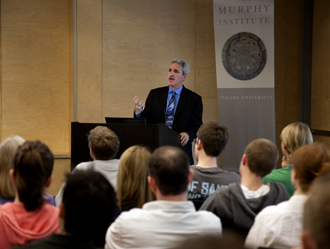Fiscal therapy for debt addiction
If anyone thought the Murphy Institute's 2012 Yates Lecture would be a feel-good talk on the economy, that notion was quickly put to rest by the speaker, economist William Gale, who opened with a brief bit of “good news” before launching into a nearly hour-long discussion about the sobering realities facing the nation.

“The imperative is closing the fiscal gap,” said William Gale, the Murphy Institute's 2012 Yates Lecture speaker. “If we wait for the perfect policy or reform to come along, it's going to be too late.” (Photo by Zack Smith)
Gale, who holds the Arjay and Frances Miller Chair in Federal Economic Policy at the Brookings Institution think tank in Washington, D.C., delivered his talk, “Fiscal Therapy: A Rehab Program for America's Debt Addiction,” to a crowded room in the Lavin-Bernick Center on Thursday (Jan. 26). He told the audience that he was certain the U.S. government would ultimately opt for the correct policies to rein in deficits and put the economy back on the right track, but it would be a long, hard process.
“I think we're going to have years of difficult discussions and battles and trade-offs,” Gale said. “Eventually we're going to do the right thing, but it's going to take a while.”
Gale urged action “now” to close the fiscal gap and argued that a shared sacrifice of spending cuts and increased tax revenue was needed before programs like Social Security and Medicare become even larger burdens on the economy. More so, trying to find the “perfect” solution shouldn't be an excuse for inaction.
“In terms of a policy conclusion, the implication is that it is much more important to do something than it is to get it exactly right,” Gale said.
While he warned that the fix would require public education and political leadership to get a coalition in Congress, he remained confident it would happen.
“We have a long history of addressing incredibly difficult problems in this country,” Gale said. “The conflict of ideas is messy, ugly and sometimes it's not fast, but it's something we do incredibly well.”
